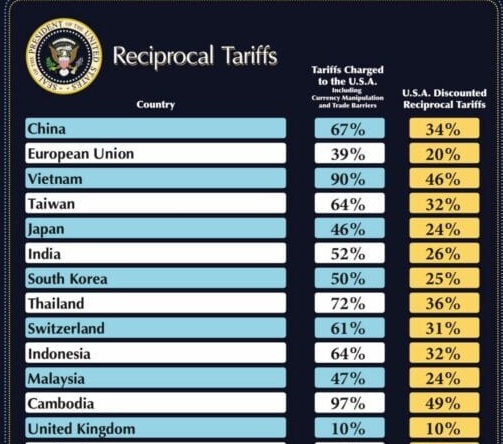China responds to Trump's tariffs with its own 34 per cent tariffs, while clouds gather over Vietnam’s growth
China has announced its countermove against US-made goods and new restrictions on the export of rare earths. Meanwhile, 50 years after the end of the Vietnam War, Hanoi deems 46 per cent tariffs imposed by the White House as “unfair”, but it is open to mediation and does not plan to retaliate. In the meantime, however, Tô Lâm could go to Moscow in May for the Victory Parade.
Beijing (AsiaNews) – China has reacted to Trump’s latest salvo in his war to rebalance trade with the world announcing its own countermeasures today, with the same duty of 34 per cent on US goods to match those the US will impose on 9 April.
Beijing has also announced further restrictions on the export of certain rare earths – minerals essential in making electronic goods – and filed a complaint against the United States with the World Trade Organization (WTO).
Beijing did not fail to take the opportunity to add 11 US firms to its list of "unreliable entities", targeted ostensibly to safeguard national security, including companies linked to arms sale to Taiwan, which China claims as part of its territory.
Should the clash between Washington and Beijing escalate, Southeast Asian countries are also paying stiff price, in particular, Vietnam, which in less than a month will mark the 50th anniversary of the fall of Saigon.
Now, Hanoi finds itself dealing with Washington's punitive trade measures, hit by "unexpected" 46 per cent tariffs. As a result, Vietnam has asked for talks with its US counterpart and demands it reconsider measures that it calls "unfair".
Giants such as Apple, Nike and Samsung Electronics are operating in the Asian country, with large-scale productions that now appear particularly exposed. Last year's trade balance saw Vietnam’s exports to the United States reach US$ 142 billion, almost 30 per cent of its GDP.
In this regard, Vietnamese Trade Minister Nguyễn Hồng Diên sent a diplomatic note to the US yesterday asking for direct talks with a US trade representative to review a decision that he considers unjustified, state media report.
Deputy Prime Minister Hồ Đức Phớc is also expected to travel to New York over the weekend to start negotiations.
At the end of an urgent cabinet meeting yesterday, Prime Minister Phạm Minh Chinh announced a task force to deal with the situation, noting that the 8 per cent growth target for the current year remains unchanged, despite doubts by experts.
“Vietnam's export-driven growth model has been highly successful, attracting multinational companies ... However, a 46 per cent US tariff would directly challenge this model," said Leif Schneider, head of international law firm Luther in Vietnam.
In the past, Hanoi itself had made a series of concessions to Washington in the (vain) hope of avoiding tariffs, including reducing tariffs and pledging to import more US goods. In all likelihood, it will offer more in the coming days.
Michael Kokalari, chief economist at VinaCapital, has studied the impact of the new tariffs on Vietnam’s economy, noting that one of the first consequences is that it will be difficult for Vietnam to meet its target of 8 per cent growth.
“The market was expecting 10 per cent tariffs on Vietnam, and we expected even lower tariffs for several reasons: targeting Vietnam is against the US’ own interest and the economic problems these punitive tariffs would spawn – if fully implemented – will likely create issues for Republicans in the midterm elections next year due to the likelihood that inflation will certainly increase.”
For analysts, the initial figure of 46 per cent is a negotiating move, with flexibility expected on the part of the White House.
Intense negotiations between Vietnamese and US trade officials are set for coming weeks, but there is no consensus – not even among experts – on what the final tariff on Vietnamese imports might be.
However, given the initial negotiating position, it is unlikely that the final figure will be less than 25 per cent, which would be a major blow to Vietnam’s GDP growth.
Meanwhile, Communist Party General Secretary Tô Lâm, the country’s top leader, is reported to be planning to visit Moscow on 9 May to participate in Russia’s 80th Victory Parade.
Russian Foreign Minister Sergey Lavrov and Deputy Prime Minister and Minister of Foreign Affairs Bùi Thanh Sơn, who is currently visiting the Russian Federation, discussed the issue at a meeting.
Lavrov noted that Vietnam remains a foreign policy priority for Russia in the Asia-Pacific region.
Both sides expressed satisfaction with the achievements in defence, security, education and training, science and technology, culture, tourism, and humanitarian cooperation, despite the challenges posed by global geopolitical situation.
Among the short-term objectives is the gradual resumption of direct flights between the two countries and the removal of obstacles in cooperation, to strengthen the multiple partnerships.
21/06/2018 10:23
05/10/2021 16:36







.png)










